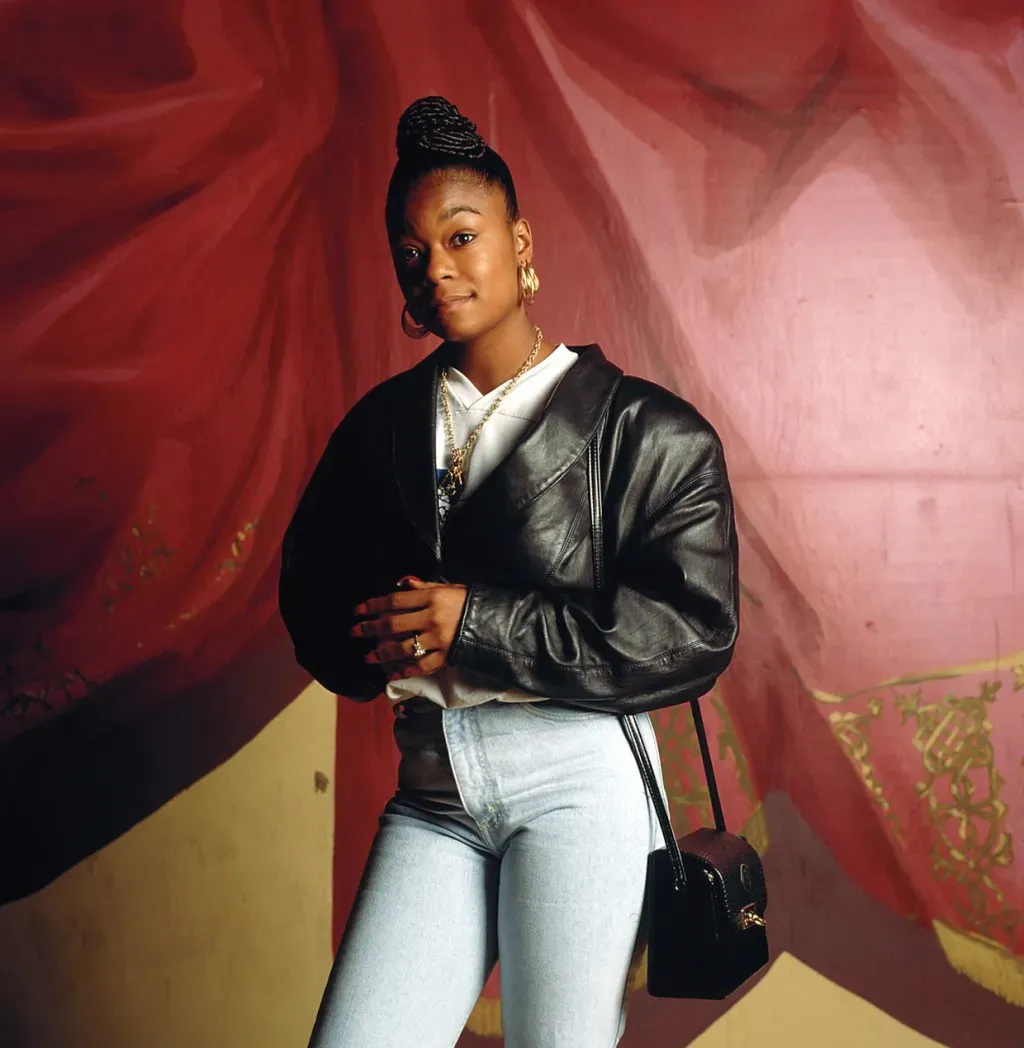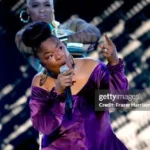Roxanne Shanté, a trailblazer in the world of hip-hop, made history as a teenage battle rapper in the 1980s and is now poised to be the first solo female rapper to receive a Grammy for lifetime achievement. Known for her iconic track “Roxanne’s Revenge,” Shanté not only influenced the genre but also paved the way for female hip-hop pioneers who followed in her footsteps. Reflecting on her journey, the 55-year-old artist expressed her surprise and gratitude for the recognition, noting that her contributions transcended music, showcasing her resilience and decision-making in an industry that often sidelined women. The history of hip-hop is incomplete without acknowledging Shanté’s impact, particularly as one of the leading female rappers of her time. As she prepares to accept this prestigious award, Roxanne Shanté’s legacy continues to inspire a new generation of artists.
The narrative of Roxanne Shanté exemplifies the evolution of female artists within the hip-hop sphere, particularly during the vibrant 1980s. Celebrated for her lyrical prowess and fierce battle skills, Shanté not only carved a niche for herself but also set a precedent for aspiring female rappers. Her legendary freestyle, “Roxanne’s Revenge,” ignited a series of responses that would become a hallmark of early rap culture, illustrating the competitive spirit that characterized the genre’s formative years. As we delve into the contributions of women in this dynamic field, Shanté’s story stands as a testament to the challenges and triumphs faced by female rappers who dared to break barriers in a male-dominated industry. Understanding her role enriches our appreciation for the diverse narratives that shape the history of hip-hop.
Roxanne Shanté: A Trailblazer in Hip-Hop History
Roxanne Shanté is not just a name; she is an indelible part of hip-hop history. As a teenage battle rapper in the 1980s, she broke barriers and opened doors for female rappers during a time when the industry was predominantly male. Her iconic track, “Roxanne’s Revenge,” released in 1984, was not just a response to the UTFO’s “Roxanne, Roxanne” but also a cultural phenomenon that sparked the infamous Roxanne Wars. This feud led to the creation of numerous response tracks, paving the way for future generations of female hip-hop pioneers. Shanté’s contributions have significantly influenced the genre and have inspired countless artists to pursue their dreams in hip-hop, ensuring that women’s voices are heard in a space that often overlooked them.
As Roxanne Shanté prepares to receive a Grammy for lifetime achievement, her journey reflects the struggles and triumphs faced by many female rappers in the 1980s. Despite the challenges of financial instability and lack of recognition during her early years, Shanté’s impact on hip-hop is undeniable. Her success illustrates the importance of representation in music, particularly for young women of color who aspire to make their mark in an industry that historically sidelined them. The Grammy recognition serves not only as a personal milestone for Shanté but also as an acknowledgment of the significant role female artists have played in shaping the history of hip-hop.
The Evolution of Female Rappers in the 1980s
The 1980s marked a pivotal decade for female rappers, with artists like Roxanne Shanté paving the way for future generations. During a time when hip-hop was still emerging from its underground roots, women like Shanté challenged societal norms and stereotypes surrounding female artists. The rise of female MCs in this era was characterized by their ability to hold their own in battle raps, proving that they could compete with their male counterparts while bringing their unique perspectives and experiences to the forefront. As the genre began to evolve, so did the narratives surrounding female rappers, leading to a more diverse representation in hip-hop.
The phenomenon of female rappers in the 1980s was not limited to individual talent but also included the support and camaraderie among women in the industry. Shanté’s battles and collaborations with other female artists created a sense of community that was essential for validating women’s contributions to hip-hop. This collective empowerment laid the groundwork for the success of later artists, allowing them to build upon the foundation laid by pioneers like Shanté. Today, the legacy of these early female rappers continues to inspire a new wave of talent, as the genre embraces more inclusive narratives and recognizes the integral role of women in hip-hop.
Roxanne Shanté’s Cultural Impact and Legacy
Roxanne Shanté’s influence extends beyond her music; she has become a cultural icon representing resilience and empowerment in hip-hop. Her story, which includes overcoming personal challenges and societal barriers, resonates with many who face similar struggles. The 2017 biopic “Roxanne Roxanne” not only highlights her journey but also emphasizes the challenges faced by women in the industry, showcasing how Shanté navigated her career amidst adversity. The film’s success at the Sundance Film Festival further cements her legacy as a significant figure in hip-hop history, illustrating that her life story is a testament to the impact of art on personal and collective narratives.
Moreover, Shanté’s recent accolades, including the NAACP Legacy Award and the Hip-Hop Grandmaster Award, reflect a growing recognition of her contributions to the genre. These honors serve to validate the importance of her work and the stories of countless other artists who have been overlooked. As Roxanne Shanté prepares to receive her Grammy, it is a moment not just for her but for all female rappers who have fought for their place in an industry that continues to evolve. Her legacy is a reminder that hip-hop is a platform for voices that have historically been marginalized, and her journey inspires future generations to rise, claim their space, and share their narratives.
Roxanne Shanté and the Rise of Battle Rap
Roxanne Shanté played a crucial role in popularizing battle rap, a cornerstone of hip-hop culture. Her prowess in freestyle battles not only showcased her lyrical skill but also highlighted the competitive spirit that defines much of hip-hop. Shanté’s ability to go toe-to-toe with male rappers, often emerging victorious, challenged the notion that rap was a male-dominated space. This shift in dynamics allowed for greater acceptance and appreciation of female talent within the genre, as her battles were celebrated and widely broadcasted, inspiring a new generation of female artists to embrace their skills.
The impact of Shanté’s battle rapping cannot be overstated; it set a precedent for how female rappers are perceived and accepted in the hip-hop community. Her famous freestyle, “Roxanne’s Revenge,” not only became an anthem of empowerment for women but also inspired other artists to engage in lyrical competitions. This spirit of competition has become a defining feature of hip-hop, and Shanté’s contributions to this art form have solidified her place as a pioneer in battle rap. As the genre continues to evolve, her legacy serves as a reminder of the importance of skill, creativity, and resilience in the face of adversity.
The Significance of “Roxanne’s Revenge” in Hip-Hop
“Roxanne’s Revenge” is more than just a song; it is a landmark moment in hip-hop history that underscored the genre’s potential for storytelling and social commentary. Released in 1984, the track was a response to the male-dominated narratives prevalent in music at the time. Roxanne Shanté’s lyrics articulated the experiences and perspectives of women in a way that had rarely been heard before, making her a trailblazer for future female artists. This single not only ignited the Roxanne Wars but also reshaped the landscape of hip-hop, showcasing the power of a woman’s voice in a male-centric industry.
The song’s success also highlighted the complexities of the music business during the 1980s, where female artists often struggled for recognition and compensation. Despite the cultural significance of “Roxanne’s Revenge,” Shanté faced challenges in receiving the financial rewards that her hit deserved. This narrative is reflective of the broader struggles that many female rappers have encountered in the industry. Nevertheless, the impact of “Roxanne’s Revenge” remains undeniable, as it laid the groundwork for future generations of female rappers to express themselves and assert their presence in hip-hop.
Roxanne Shanté’s Influence on Future Generations
Roxanne Shanté’s legacy goes beyond her own music; she has inspired countless artists, including prominent figures like Nas, who credit her as a significant influence in their careers. Nas has publicly acknowledged how Shanté’s success in the 1980s motivated him to pursue rap seriously, illustrating the ripple effect of her contributions to the genre. This generational impact underscores the importance of representation in hip-hop, as Shanté’s story serves as a beacon of hope for aspiring artists who might see themselves reflected in her journey.
In addition to inspiring individual artists, Shanté’s story has opened doors for discussions about the role of women in hip-hop. Her experiences have sparked dialogues about equity, recognition, and the importance of supporting female artists in a space that often marginalizes their contributions. As more female rappers emerge today, they do so on the foundation laid by pioneers like Roxanne Shanté. Her influence is evident in the music of contemporary artists who blend the raw authenticity of battle rap with themes of empowerment and resilience, creating a vibrant and dynamic future for women in hip-hop.
The Recognition of Female Hip-Hop Pioneers
As the music industry evolves, the recognition of female hip-hop pioneers like Roxanne Shanté is becoming increasingly vital. For years, women in hip-hop have been overlooked, despite their significant contributions to the genre’s development. Shanté’s recent Grammy nomination for lifetime achievement is a historic moment that underscores the importance of acknowledging the women who helped shape hip-hop culture. This recognition not only honors their legacy but also encourages a more inclusive narrative within the industry.
The acknowledgment of female pioneers also serves as a call to action for the music industry to prioritize equity and representation. By celebrating the achievements of artists like Roxanne Shanté, the industry can foster an environment where female rappers are recognized and valued for their contributions. This shift is crucial for the continued growth and evolution of hip-hop, ensuring that the voices of women are not just heard but celebrated as integral to the genre’s rich tapestry.
Roxanne Shanté and Her Role in Hip-Hop’s Evolution
Roxanne Shanté’s journey in hip-hop exemplifies the evolution of the genre from its underground roots to a mainstream powerhouse. As one of the first female MCs to gain national recognition, she played an essential role in establishing a place for women in a predominantly male arena. Her success with “Roxanne’s Revenge” marked a turning point in hip-hop, showcasing the potential for female artists to not only participate but also dominate in a competitive landscape. Shanté’s contributions highlight the importance of diversity in hip-hop, paving the way for future female rappers to emerge and thrive.
The evolution of hip-hop has also been marked by the increasing visibility of female artists, and Roxanne Shanté’s influence remains relevant today. As contemporary female rappers draw inspiration from her pioneering spirit, they continue to push boundaries and challenge stereotypes. Shanté’s legacy serves as a reminder of the importance of representation in music and the need for ongoing support for female artists. The impact of her work is felt not just in the music industry but also in the broader cultural landscape, where her story inspires empowerment and resilience among women everywhere.
The Impact of Roxanne Shanté’s Music on Culture
Roxanne Shanté’s music has had a profound impact on culture, particularly in how it has shaped the narrative surrounding women in hip-hop. Her ability to articulate the experiences of women through her lyrics resonated with audiences, making her a voice for those who often felt marginalized. Tracks like “Roxanne’s Revenge” became anthems of empowerment, encouraging women to express themselves and assert their presence in a male-dominated industry. This cultural shift has been significant, as it has paved the way for future generations of female artists to feel validated in their artistic pursuits.
Moreover, Shanté’s influence extends beyond music; it has sparked conversations about gender roles and representation in hip-hop. As her story gains more recognition, it encourages a reevaluation of the contributions of female artists throughout hip-hop history. The cultural impact of Shanté’s music continues to inspire new movements within the genre, where women are increasingly taking center stage and redefining what it means to be a female rapper. As the industry evolves, Roxanne Shanté’s legacy serves as a powerful reminder of the importance of inclusivity and the celebration of diverse voices in hip-hop.
Frequently Asked Questions
What is Roxanne Shanté known for in the history of hip-hop?
Roxanne Shanté is celebrated as a pioneering female rapper in the history of hip-hop, particularly known for her early contributions as a teenage battle rapper in the 1980s. Her famous freestyle ‘Roxanne’s Revenge’ sparked the Roxanne Wars, a significant rap feud that underscored her influence in the genre.
How did ‘Roxanne’s Revenge’ impact female rappers in the 1980s?
‘Roxanne’s Revenge’ had a profound impact on female rappers in the 1980s by challenging gender norms in hip-hop. It showcased Roxanne Shanté’s lyrical prowess and set a precedent for women in rap, inspiring future generations of female hip-hop artists to assert their voices and talents in a male-dominated industry.
Is Roxanne Shanté receiving any awards for her contributions to hip-hop?
Yes, Roxanne Shanté is set to receive a Grammy for lifetime achievement, making her the first solo female rapper to be honored in this way. This recognition reflects her significant contributions to hip-hop and her status as a trailblazer among female hip-hop pioneers.
What was the significance of Roxanne Shanté in New York City’s underground rap scene?
In New York City’s underground rap scene during the early 1980s, Roxanne Shanté was a prominent figure, known for her undefeated status in battle rapping. Her rise to fame with ‘Roxanne’s Revenge’ positioned her as a key player in the development of hip-hop culture and showcased the talent emerging from the Queensbridge Houses.
How did Roxanne Shanté influence future hip-hop artists like Nas?
Roxanne Shanté’s success in the 1980s inspired many future hip-hop artists, including Nas, who cited her as a significant influence on his decision to pursue rap seriously. Her groundbreaking work as a female rapper demonstrated the potential for success in the hip-hop industry, encouraging others to follow in her footsteps.
What awards has Roxanne Shanté received recently for her work in hip-hop?
Recently, Roxanne Shanté received the NAACP Legacy Award and the Hip-Hop Grandmaster Award from the Paid in Full Foundation. These honors recognize her contributions to hip-hop and aim to rectify the financial injustices faced by artists in the industry.
What themes are explored in the biopic ‘Roxanne Roxanne’ about Roxanne Shanté?
The biopic ‘Roxanne Roxanne’ explores themes of resilience, empowerment, and the challenges faced by Roxanne Shanté as she navigated life in a single-parent household, motherhood at a young age, and her rise in the hip-hop world. It highlights her journey from the Queensbridge Houses to becoming a legendary figure in music.
How did Roxanne Shanté’s freestyle ‘Roxanne’s Revenge’ change her life?
Roxanne Shanté’s freestyle ‘Roxanne’s Revenge’ propelled her into the national spotlight, marking a turning point in her life. Although she experienced little financial gain at the time, the song established her as a cultural icon and allowed her to travel the world, significantly impacting her legacy in hip-hop.
What was Roxanne Shanté’s early interest before becoming a rapper?
Before becoming a rapper, Roxanne Shanté was more interested in the wordplay of comedians, particularly her idol Nipsey Russell. However, her talent for battle rapping emerged as she faced challenges from peers, leading her to embrace her musical career.
What does Roxanne Shanté believe about her past and future?
Roxanne Shanté reflects on her past with optimism, stating that she would reassure her younger self that everything would turn out well. Her journey demonstrates the importance of perseverance and encourages others to believe in their potential, regardless of their circumstances.
| Key Point | Details |
|---|---|
| Roxanne Shanté’s Achievement | Set to be the first solo female rapper to receive a Grammy for lifetime achievement. |
| Early Life | Became a fixture in NYC’s underground rap scene by age 10 and was an undefeated battle rapper by age 13. |
| Roxanne’s Revenge | Her 1984 single sparked the Roxanne Wars, leading to 86 response songs. |
| Background and Influences | Grew up in Queensbridge Houses; inspired future legends like Nas and Biz Markie. |
| Career Challenges | Despite her success, she faced financial struggles and did not receive large compensations for her work. |
| Recognition and Awards | Honored with the NAACP Legacy Award and Hip-Hop Grandmaster Award, receiving around $1 million. |
| Legacy and Influence | Her story is documented in the biopic ‘Roxanne Roxanne,’ showcasing her resilience and impact on hip-hop. |
Summary
Roxanne Shanté has made a remarkable impact on the hip-hop industry, not only as an influential rapper but also as a trailblazer for women in the genre. Her journey from a young battle rapper to a Grammy award recipient highlights the evolution of her career and the recognition she has long deserved. With her recent accolades and the legacy she has built, Shanté’s story serves as an inspiration for aspiring artists and a testament to the enduring power of hip-hop.








